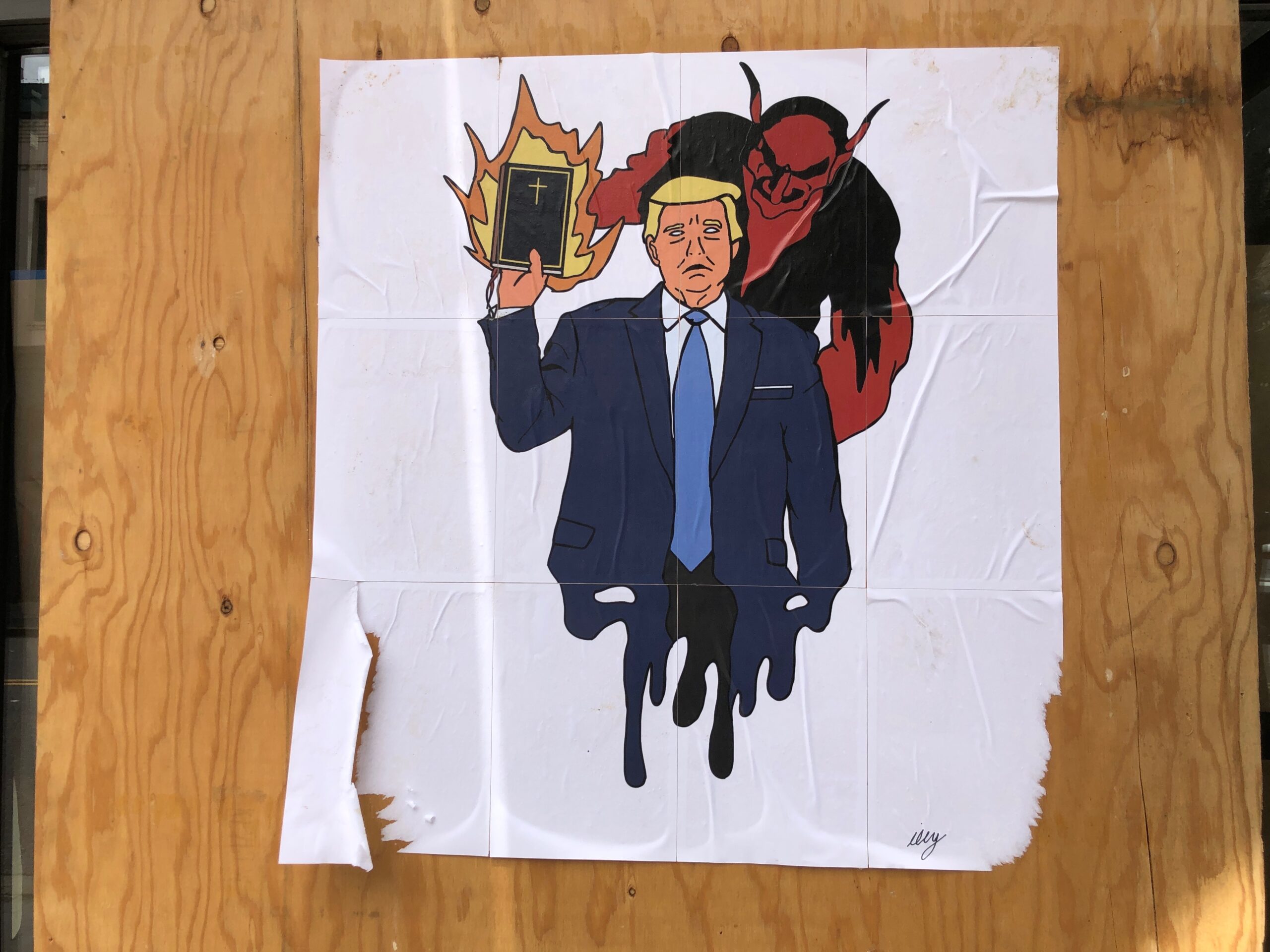






























































Photograph by Nathaniel St. Clair
“Trump could surprise on the upside,” writes Edward Luce, who claims to know “what Trump most cares about.” Lacking intimate knowledge of the inner workings of the president-elect’s personal thoughts, us non-pundits are relegated to looking at other indicators.
We can try to decipher Trump’s abysmal cabinet picks. “If Trump has nominated second-tier establishment types for powerful positions that is partly because so many of the more accomplished practitioners have migrated to the Democrats,” according to a London Review of Books commentator.
But the very best predictor of what Trump would do is to look at the current trajectory of US policy. That will tell us more than anything else about what to expect. The two major parties have a reciprocal relationship as seen with the Ukraine War as well as with the existential threats of global warming and nuclear conflict, described below. Meanwhile, the two-party duopoly as a system trudges further and further to the right.
Victoria’s Secret
A thread of commonality, running through the partisan bickering around the ever-escalating US proxy war against Russia in Ukraine, is exemplified by the role of neoconservative war hawk Victoria Nuland. Back before President George W. Bush and his Vice President Dick Cheney were rehabilitated by the Democrats, Nuland served these war criminals as US ambassador to NATO among other assignments, promoting the destruction of Afghanistan and Iraq.
The neocons migrated to the Democratic Party as it became the new party of war under President Barack Obama, with Nuland playing a prominent part as assistant secretary of state in devastating Libya and Syria. She also became a key architect of Washington’s Ukraine policy, where she was involved on the ground during the Euromaidan coup.
Although Trump in his first term in office passed over Nuland for neocons of his own choosing, President Joe Biden jumped to promote her to undersecretary of state, continuing her pivotal part boosting the proxy war against Russia.
Chicken Kiev is not on the menu
Now, the new president-elect has pledged to “get the war with Russia and Ukraine ended.” Recall, though, former President Richard Nixon’s “secret peace plan” to end the Vietnam War, which meant continuing the carnage.
For all of Trump’s posturing about ending the war, his pick for national security advisor, Mike Waltz, has already said that he’s “working hand-in-glove” with the Biden team on Ukraine. So, much for a change in course for the imperial agenda!
In other words, Biden’s recent escalating the conflict in Ukraine collaborates with Trump in the goal, evidently shared by both parties, of weaking Russia.
Donald “America First” Trump is not about to willingly abide by any diminution of the US strategic posture nor accept conciliation with Moscow. In his first term in office, Trump shifted the US foreign policy posture to “great power rivalry” with his 2017 National Security Strategy and his 2018 National Defense Strategy.
On the left, economists Richard Wolff and Michael Hudson hold out hope for a peace initiative in Ukraine that guarantees Russia’s security. They bank on a declining US empire that can no longer prevail. Perhaps, but the alternative may end up looking more like Haiti, Afghanistan, and Libya, under Uncle Sam’s beneficence.
Unlike those deliberately failed states, Russia has the bomb, as Donald Trump pointed out in his debate with Kamala Harris. Antiwar.com reports officials from the US and the EU have discussed giving Ukraine nuclear weapons. And that raises the looming prospects for nuclear war and the related existential threat of global warming.
Cold comfort on global warming
While the planet teeters at the tipping point of no return from human-caused global warming, the Red Team whistles “drill baby drill.”
The Blue Team weaponizes science as a cudgel against their rivals, without trying to reverse the march to climate catastrophe. Rather, temporary team captain Kamala Harris giggled approval of fracking. She knew that sycophantic liberals would still support her.
This pitiful record reveals that neither team has any intention of solving the problem. Both are dedicated to keeping the US as the world’s leading oil producer and serving the energy lobby.
Back in 1997, then US Vice President Al Gore jetted to Kyoto, Japan. There he negotiated an exemption from greenhouse gas emission reductions for the US military, the world’s single largest consumer of fossil fuel. Despite a lot of political invective about the Red Team being climate deniers, the Blue Team never even tried to put the Kyoto Protocol to a vote by the US Senate.
Oil production temporarily declined during oilman George W. Bush’s watch. With the Democrat’s return in 2008, Barack Obama saw US oil production grow by a reported 77%. He boasted “we’ve added enough new oil and gas pipeline to circle the Earth and then some.”
The trend of ever-expanding US oil production, through the Trump and now the Biden years, was largely independent of who was in the White House. In the absence of any exercise of political will to address the issue, fossil fuel production continues to increase.
Nuclear winter is not a desirable solution to global warming
Apocalypse from an over-heated planet is getting to look like a lot like a best-case scenario. Our kind should survive so long, given the risks of nuclear war, which both Blue and Red teams are lurching into.
The offensive use of nuclear weapons is a bipartisan position enshrined in a “first-use” policy. While the US has not dropped another A-bomb since World War II, it has continually used atomic weapons in the same way that a robber uses a gun held to the head of a victim to force its way. This is in violation of the 1968 Nuclear Non-Proliferation Treaty.
Republican George W. Bush unilaterally withdrew from the Anti-ballistic Missile Treaty in 2001 and initiated modernization of the US nuclear triad of land-based intercontinental ballistic missiles, submarine-launched ballistic missiles, and strategic bombers.
President Obama embraced and extended his Republican predecessor’s nuclear modernization with life-extension programs for existing stockpiles augmented by increased spending.
The handoff to President Trump saw further nuclear expansion of low-yield weapons, more nuclear submarines, bombers, and missile systems, and development of a new warhead for Trident missiles. In 2019, Trump unilaterally withdrew from the Intermediate-Range Nuclear Forces (INF) Treaty and left the Open Skies Treaty the next year.
President Biden continued and expanded the nuclear war fighting arsenal with modernization of Columbia-class submarines, B-21 bombers, and the Ground-Based Strategic Deterrent missile system.
The bipartisan rush to Armageddon makes one nostalgic for Ronald Reagan. He had worked to reduce nuclear arms with the INF Treaty of 1987. His Strategic Arms Reduction Treaty was finalized in 1991 under fellow Republican George H.W. Bush’s presidency.
From an historical perspective
Given the larger picture of an ever more aggressive and dangerous US imperium, the nuances of a Biden to Trump transition look more like details than strategic shifts. Behind the theatrical façade of partisan politics is a bedrock consensus on US empire and fealty to the ruling elites. Besides, there is the enduring and permanent apparatus of the state.
No, the opposing wings of the US duopoly are not the same. In fact, each succeeding administration is worse than the previous, irrespective of party. That is the reciprocally reinforcing rightward progression of the two-party system.
It’s like when I was a kid, and my parents sent me off to summer camp. Toward the end of the season, we had week-long “color games.” Half the camp was in the Red Team, the other half in the Blue. After seven intense days of competition, where we zealously hated our rival bunkmates, we all hugged.
Now the would-be grownups in Washington do the same. After the November 5th election, Biden warmly welcomed to the White House the person he previously likened to Hitler. That’s proof positive that we are being gamed.
The post There’s No Upside to Trump appeared first on CounterPunch.org.
This post was originally published on CounterPunch.org.